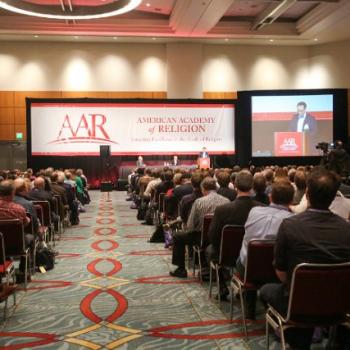Under the heading of this post’s title, I will share one example of what it can mean that is appropriate, and one example of what it could mean that is not.
Matthew Malcolm has suggested that it would be interesting to have a program unit or other session at the Society of Biblical Literature conference about the gospel in the New Testament – in other words, what the message was that was proclaimed by various individuals and groups in the early Christian movement, as evidenced by the New Testament writings. I think that’s a great idea, and could be really interesting.
On the other hand, Matthew Emerson discussed reactions to a recent review in RBL written by David Maas, which concluded with the following:
To read Schreiner’s book is to matriculate in his classroom, as it were. He writes for a room full of like-minded seminary students. These students will appreciate Schreiner’s strong conservative voice that unites the whole of biblical revelation around God’s persistent kingdom march. There will inevitably be those who never enroll in his class. He explicitly writes that he is not writing a technical work for the scholarly community (x) that gives careful consideration to text-critical issues. Moreover, those outside Schreiner’s conservative interpretive circle will not even audit his class. Schreiner himself notes that “no book can accomplish everything” (xv), nor will his book resonate with everyone (xv). However, whoever enters his classroom via his book will undoubtedly benefit from his call to come see the beautiful King.
Emerson seemed to think that the problem with the review was the explicit faith commitments of its author. It was not. The issue, in my opinion, is that the review did not merely offer a review from a scholarly perspective that reflects religious commitment, but that the review crossed over into the language of devotion on the one hand, and taking mean-spirited swipes at those who are not conservative on the other. It seems to me that an academic organization can most effectively include a variety of faith perspectives and non-religious perspectives when it is recognized that that organization is a place for scholarly conversations, and not an appropriate venue for devotional or evangelistic activities, nor a place where one should take pot shots at other groups rather than engaging their views in a serious, respectful, and critical scholarly fashion.
I think Matthew Malcolm’s suggestion would be a great addition to SBL’s focuses.
I think that SBL has already gone far enough in the direction of allowing voices to be heard which play fast and loose with the definitions of academic research. As Emerson rightly points out, we all have biases, and so the notion of excluding biases viewpoints from the academy is a nonsensical one. But that doesn’t justify adding devotional, anti-religious, anti-liberal, or any other sort of language to academic reviews that simply doesn’t belong there.













